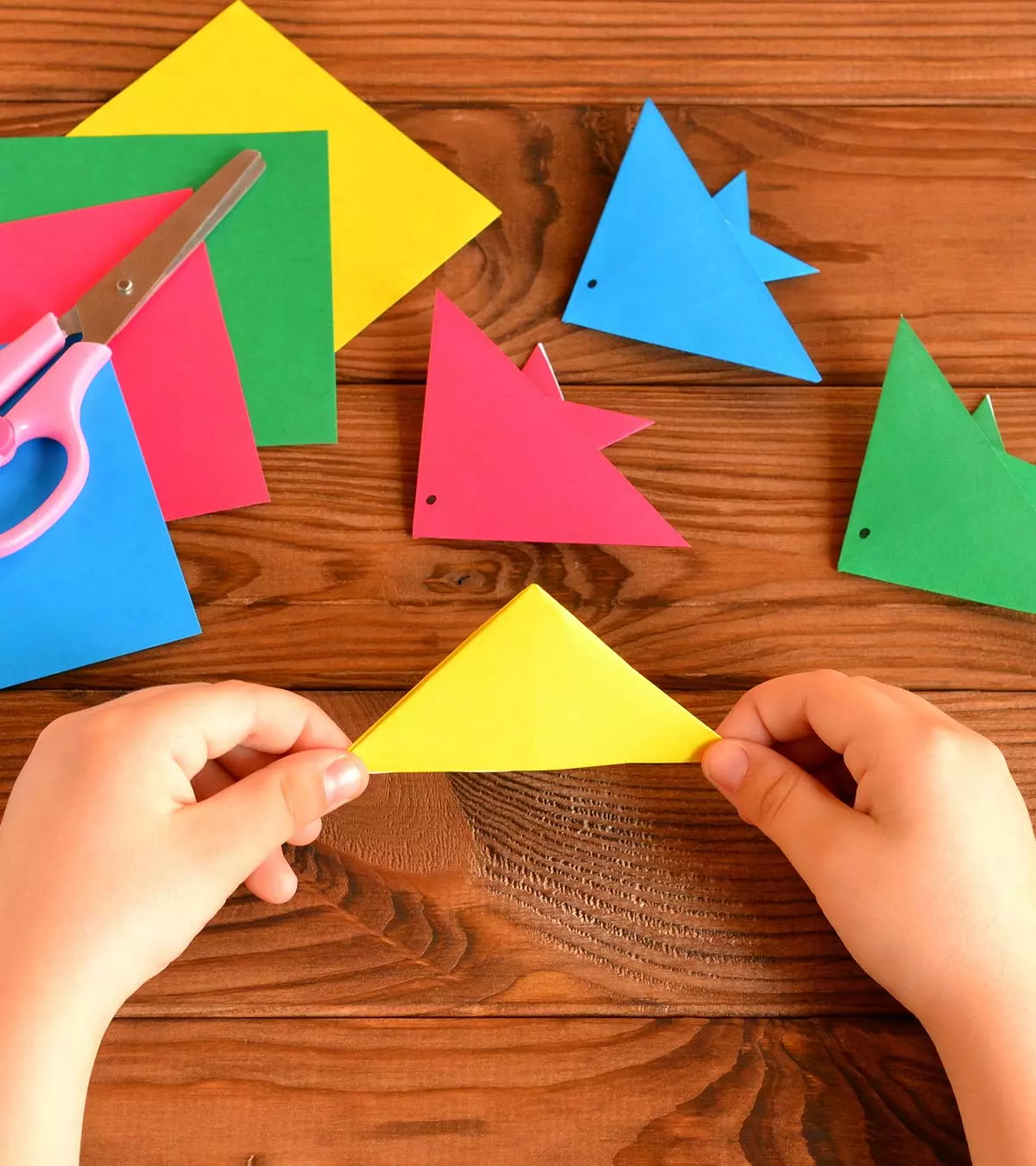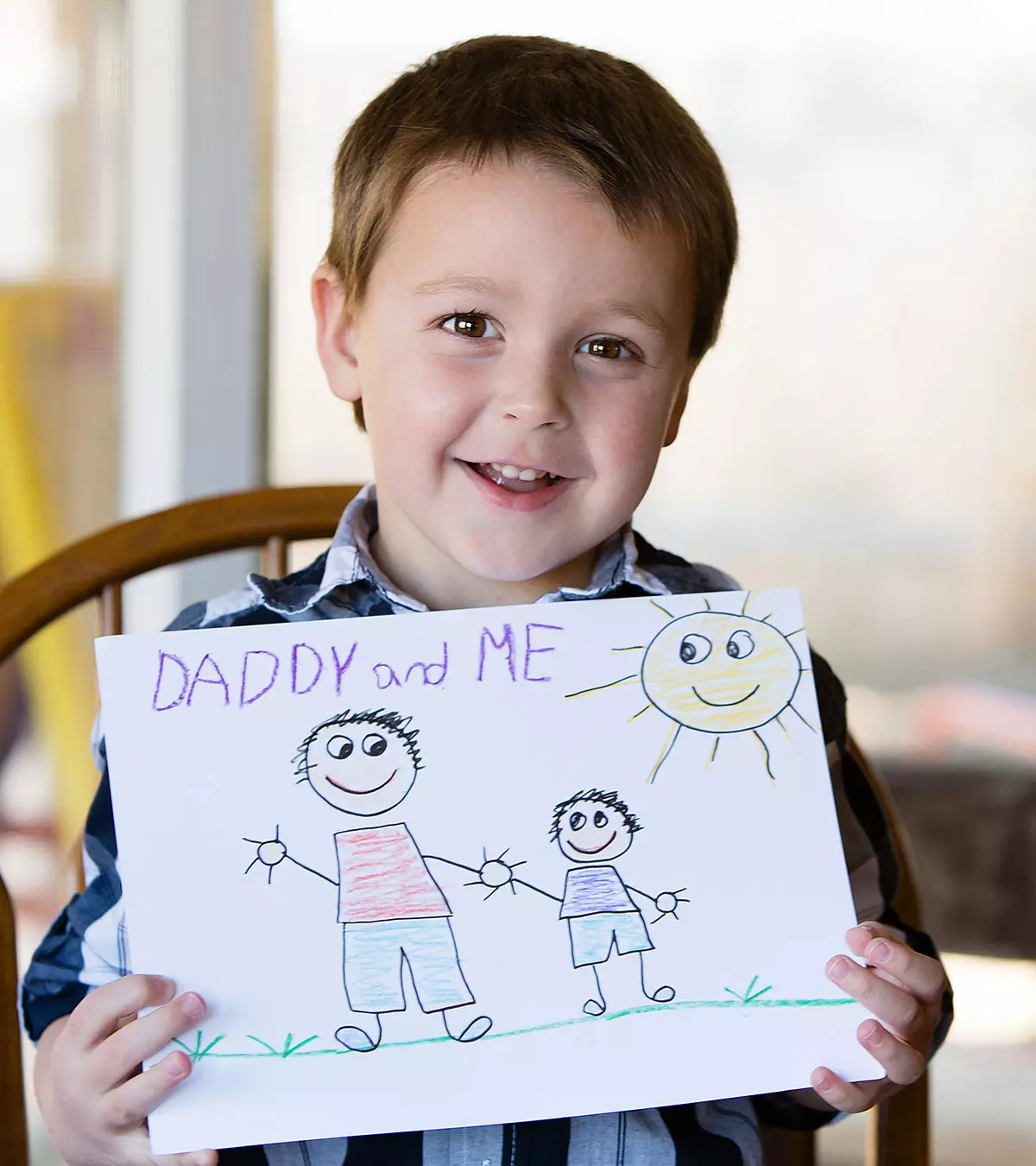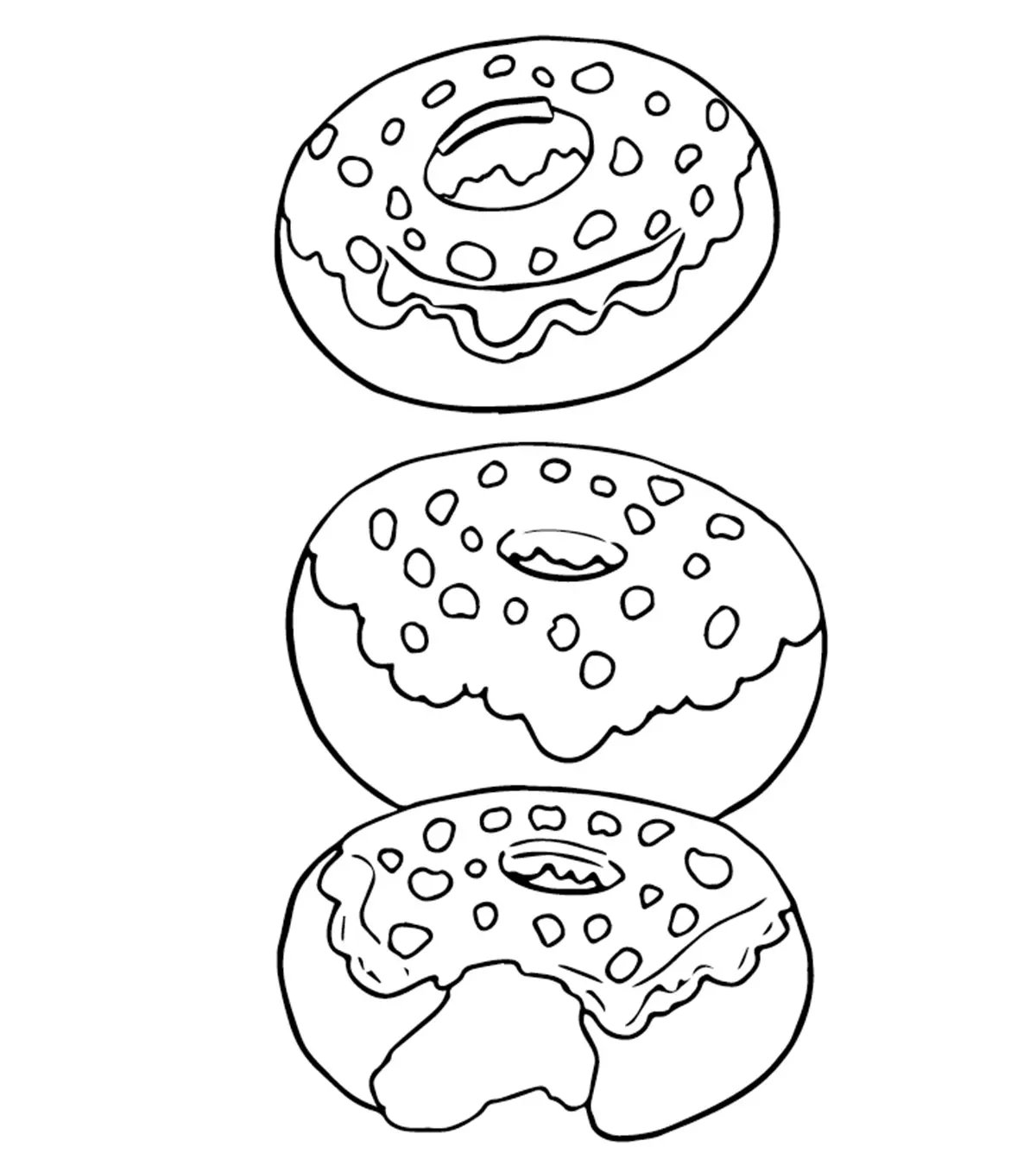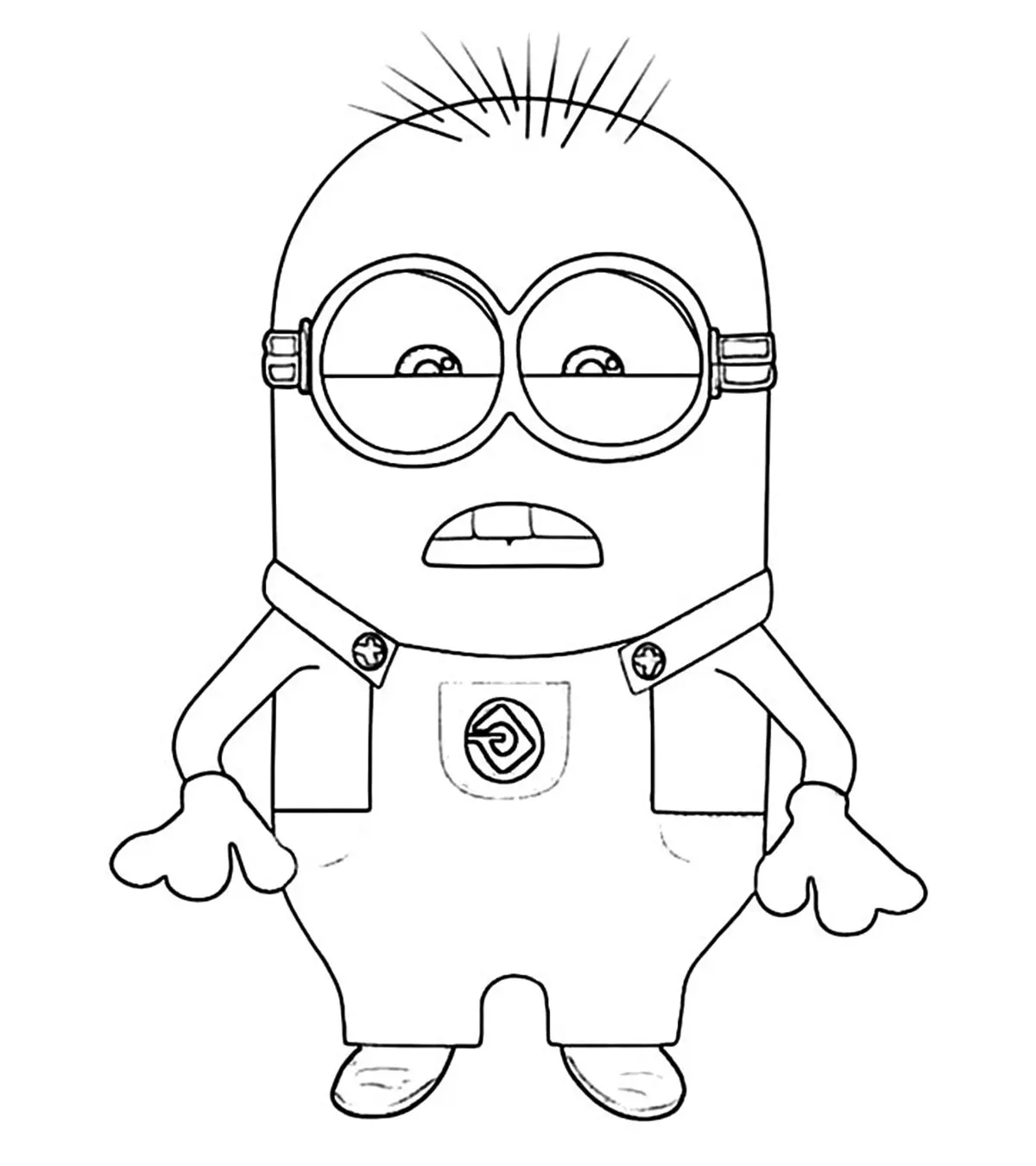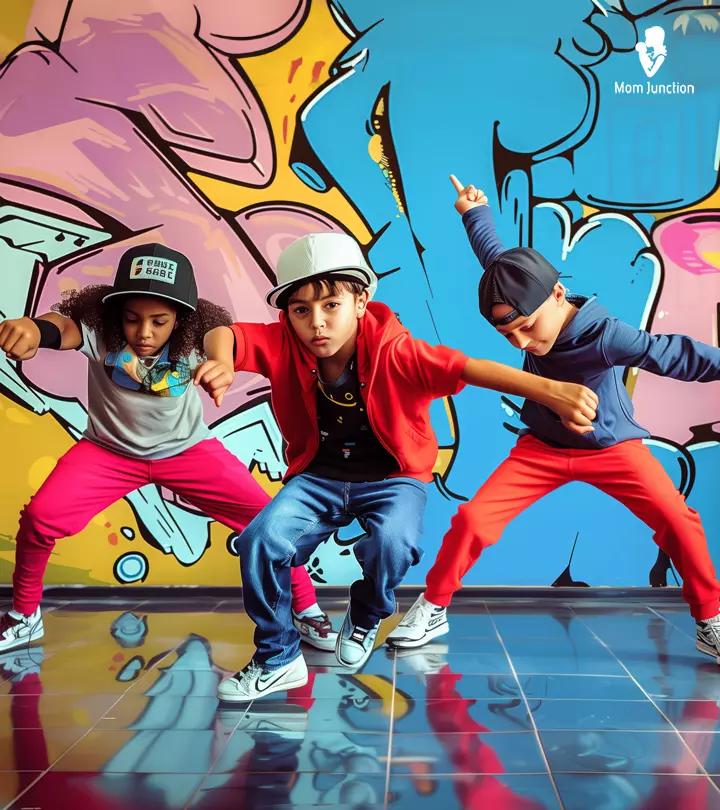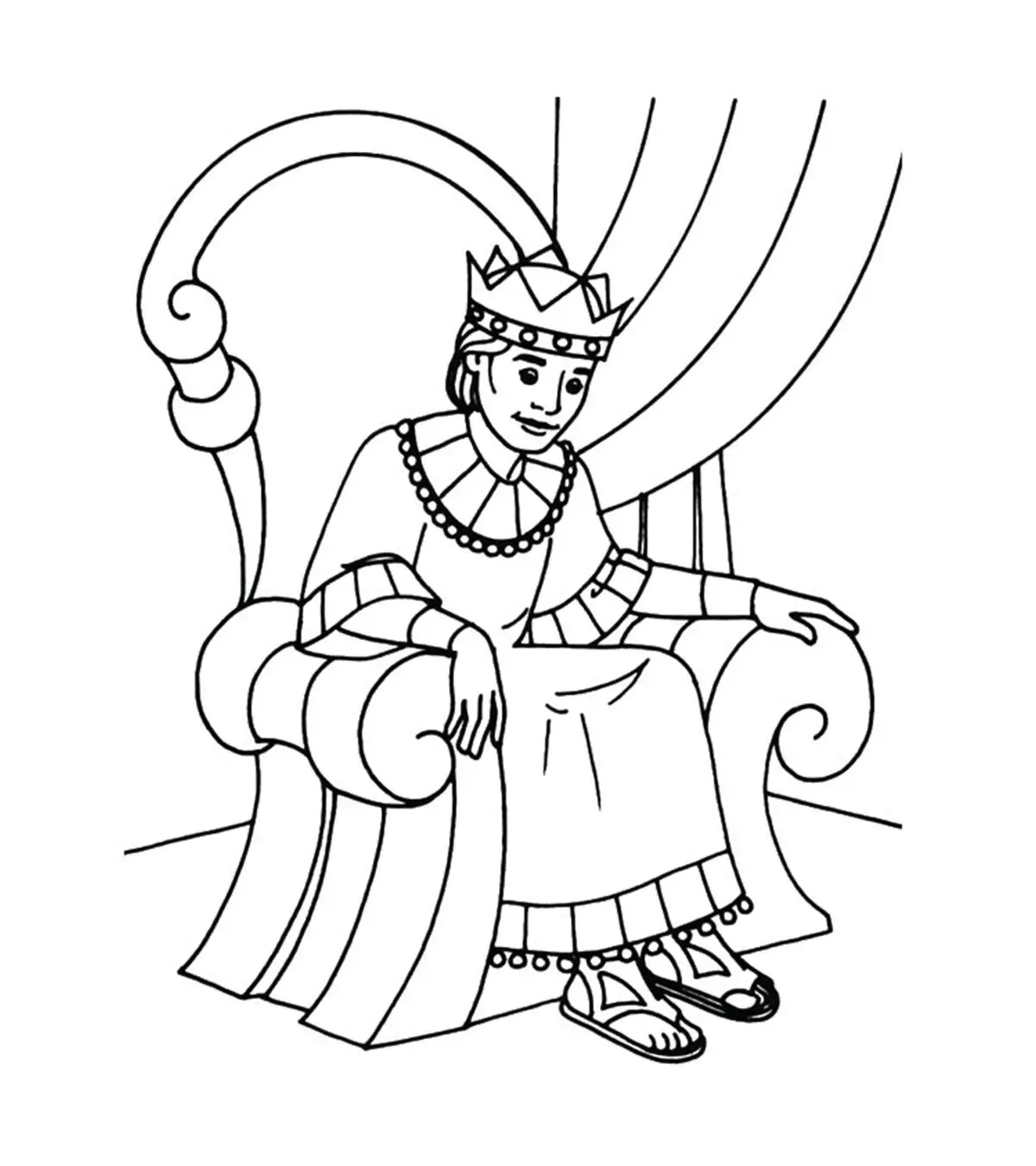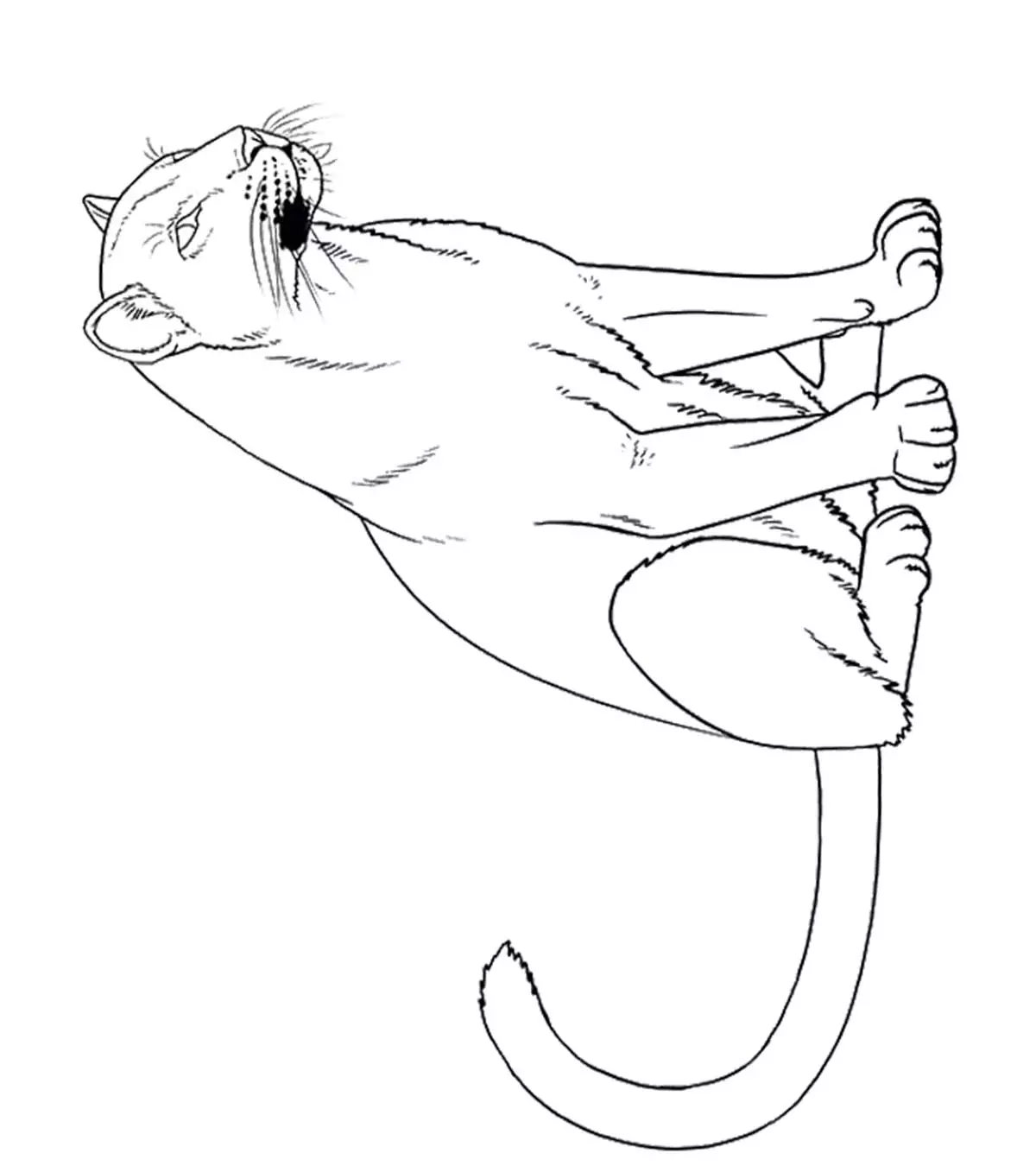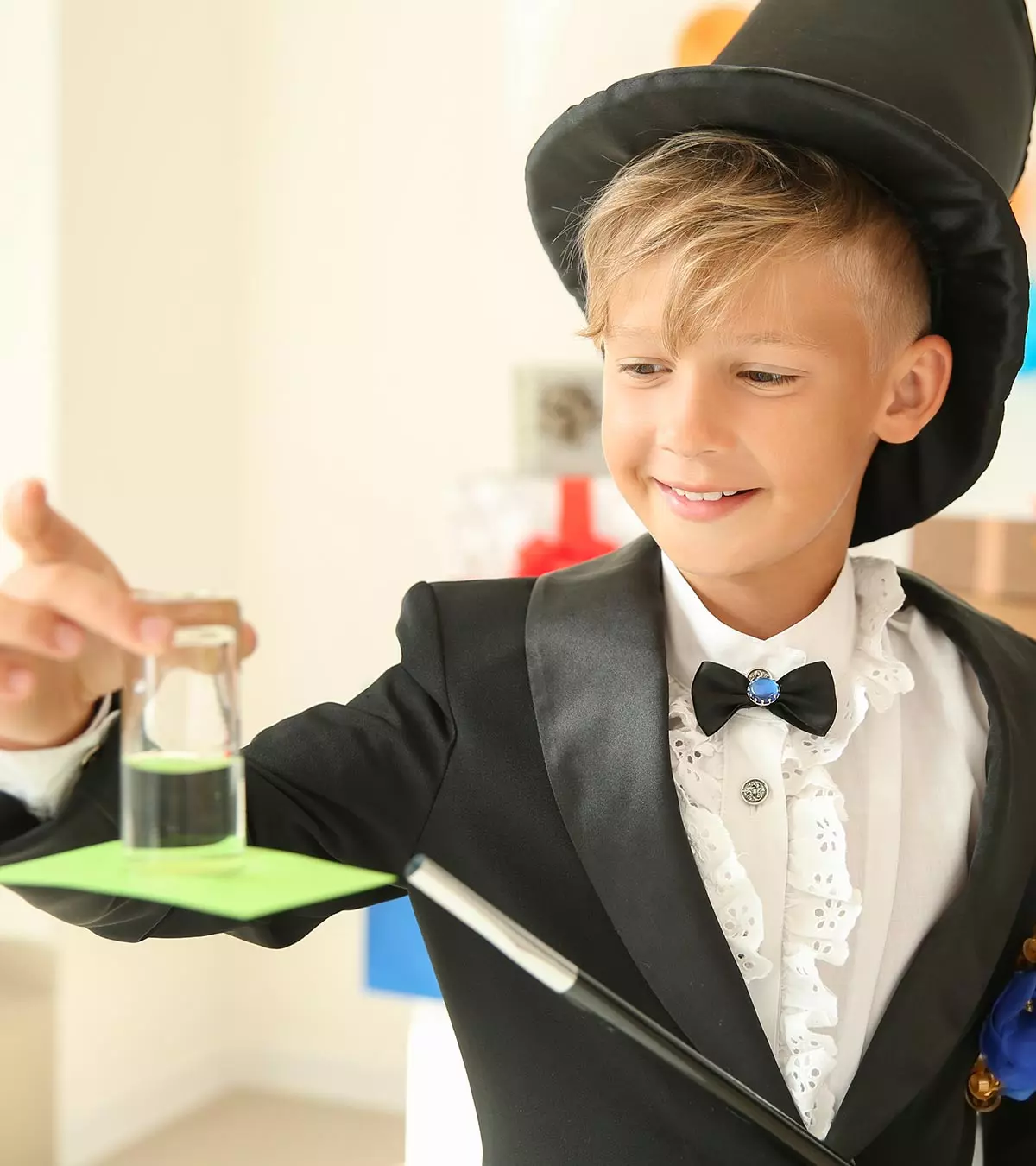
Image: ShutterStock
As parents, the joyous feeling of bringing a new human into the world cannot be matched by anything else. There are a lot of interesting learning activities for a one-month-old baby. Babies in their first month are sensitive to the environment around them, and they are slowly but steadily developing their vision and hearing abilities. At the end of the month, as their sensory stimulation keeps increasing you might find that your baby has started responding to the bright colors and soft noises you introduce her to through these activities. Read on to know about how you can slowly introduce your one-month-old baby to the activities we’ve mentioned.

Key Pointers
- Babies’ vision and hearing abilities are developing in their first month.
- Engage in interesting and safe activities to aid their development.
- Activities such as head support, reflexes, and response to crying help.
- Crying is natural communication and can be eased with affection and attention.
- Comparing baby development to their due date is crucial due to variation.
Developments In Your One-Month-Old Baby
This is the time when your baby’s development will look like a whirlwind.
When you pause to take a look at them, you may notice the following developmental marks (1):
- By the end of the month, you may find they are heavier and larger than before.
- Even though one-month-old babies cannot yet grasp toys, they can still benefit from the sensory experience of touching and exploring them. Soft, textured toys or objects with different shapes and sizes can provide a variety of sensory experiences, helping babies develop their sense of touch.
 Trivia
Trivia- They can slowly begin to recognize the smell of their caregiver.
- Although their vision or sight has not fully developed, they can see objects in close proximity and may be able to identify some basic gestures and expressions.
- In the initial days, they may often keep eyes closed, but with time they will start responding to bright colors and contrasting patterns.
- Your baby has been familiar with your voice since she was there in your womb, and they can easily identify it. Talking or singing to your little one to keep the interaction active could be a great approach. Babies love gentle and soothing sounds and music rather than loud ones.
Ginny B., mother to two daughters, describes her experience with parenting her younger daughter, one-month-old Mina. She explains that newborns have excellent hearing and can sometimes distinguish their parents’ voices. There is no real way to interact with this, she says, other than just talking to your baby or singing to your baby. She adds, “I know for Mina it does tend to help when she hears one of our voices, mine or my husband’s, to calm down when she’s having those colic episodes. (i)”
- A baby can make throaty noises or cry to communicate hunger or other issues within the first month of life.
3 Learning Activities Of One-Month-Old Baby
Here are three interesting one-month-old baby activities that you can try. These activities for a one-month-old baby will help your little one develop the their social, emotional, and cognitive skills while being completely safe:
1. Your Baby Needs Head Support:

Image: Shutterstock
Your baby is too young and still needs the head support beneath (2).
- It will take time for their muscles to get stronger.
- Within a few months, they can lift up their head without support.
- You can use a headrest for them now.
- Tummy time several times a day can help strengthen the baby’s neck and shoulder muscles and help them develop independent head control over time.
2. Reflexes Of Your 1-Month-Old:

Image: Shutterstock
Your baby slowly develops their reflexes over time. Here are the developments you can notice (3):
- Turn head to the nipple or the bottle.
- Extend hands to hold on to you, when startled.
- Grips get stronger with time, indicating proper motor skills development.
- Grab on when you put your finger in their palm.
3. Crying:

Image: Shutterstock
No matter how much you prepare, you are never ready to hear your baby cry, especially for a longer time. It is their way of expressing any discomfort they are in. You may look at the following factors if your baby is crying (4). It is their way of expressing any discomfort they are in.
Summer Hull, mother of three, talks about her experiences with Baby S, her 1-month-old youngest child. She says, “The hardest crying for us is often in the evening when she tends to cry more for no obvious reason. This often falls during dinner, bathtime, and bedtime, so it makes for a stressful end to the day when everyone is already tired and ready for sleep (ii).”
- So what can you do in such cases?
- Check the diapers, if they need to be changed.
- Check if they are hungry.
- Check if they need a burp.
- Check if they are sleepy.
- Check if they are uncomfortable with the environment around them.
You should not worry much about crying in babies, as it is the only way of communication.
You may respond to a crying baby and shower them with love but let them cry for short periods of time to help them develop their emotional skills.
 Quick tip
Quick tipIs My Baby’s Development Normal?
This is one worry every mother has, so let us clarify your doubt. You must first understand that every baby is unique and develops in her own way. Below are the simple guidelines that show potential of your baby:
- If your baby is born prematurely, they will need more time to get started with different activities. This is the simple reason why doctors give two ages to the baby born prematurely (5).
- The chronological age is calculated from the date of birth of your baby.
- The age that is calculated from the due date of your baby.
- You must measure your baby’s development against her right age and not the actual date of birth. This parameter will help your healthcare professional measure the development of your baby.
Frequently Asked Questions
1. What toys can a one-month-old play with?
Your one-month-old baby can recognize sounds, visually follow moving objects, and move their heads from one side to another while lying on their back (6). Therefore, suggestions for toys can include bright and contrasting objects, playmat gyms with colorful objects hanging from them, and flashcards.
2. How do I entertain a one-month-old baby?
You can easily entertain your month-old baby with the help of the following activities (7):
- Smile at them
- Hold their hands and clap
- Play with a puppet sock by moving it in front of her
- Slowly do dance-like movements with them on your shoulder
3. How often should I engage in learning activities with my one-month-old baby?
The World Health Organization (WHO) recommends that infants spend several hours in active play daily, including interactive floor play and at least 30 minutes of tummy time.
4. What kind of songs or music are best for one-month-old babies?
Soothing and relaxing music or lullabies are best for one-month-old babies (8). They create a calm atmosphere and help babies relax and sleep better.
5. Are any toys or objects particularly good for one-month-old babies?
Toys they can hold to and suck on are good choices. You can also opt for toys that make noises like rattles and large rings. Squeeze toys and textured balls are also some choices of good toys for one-month-old babies.
6. What developmental milestones should my one-month-old baby reach, and how can I help them?
The one-month-old babies’ milestones are primarily focused on the development of their vision, hearing, taste, and smell. For example, moving head from side to side, bringing fists close to the face, focusing at 8-12 inches, looking at high-contrast images, preferring sweet smells and tastes, and completely developed hearing. You can perform activities like holding their hands and clapping, shaking a rattle near them, and showing them high-contrast images on flashcards to help them achieve these milestones.
7. How can I stimulate my baby’s senses and cognitive development at this age?
Back-and-forth interactions with your baby enable them to develop their senses (9). You can perform activities such as reading to them, stacking blocks, and playing with balls for their cognitive development.
8. How important is tummy time for my baby’s development, and how can I make it enjoyable for them?
Babies need tummy time to develop the muscles required for neck control, rolling over, sitting up, crawling, and walking (10). You can link tummy time with a pleasurable activity such as playtime to make it more enjoyable for them (11). Rub or pat their backs to soothe them and make encouraging noises. Choose a time when the baby is fed and rested.
9. Are there any apps or educational programs designed specifically for one-month-old babies?
There are several apps available on App Store and Play Store that help track your baby’s growth right from pregnancy. These apps will help you design age-appropriate games and activities for your one-month-old.
You must measure your baby’s development against their right age and not the actual date of birth. This parameter will help your healthcare professional measure the development of your baby.
Seek advice from your doctor in case you have any queries.
Infographic: Engaging With A One-month-old Baby
While your one-month-old is asleep most of the time, and it may seem that they would not understand if you interact with them, it is essential to communicate with your little baby. It may help you develop an emotional bond and make the baby feel more connected to you. Illustration: Momjunction Design Team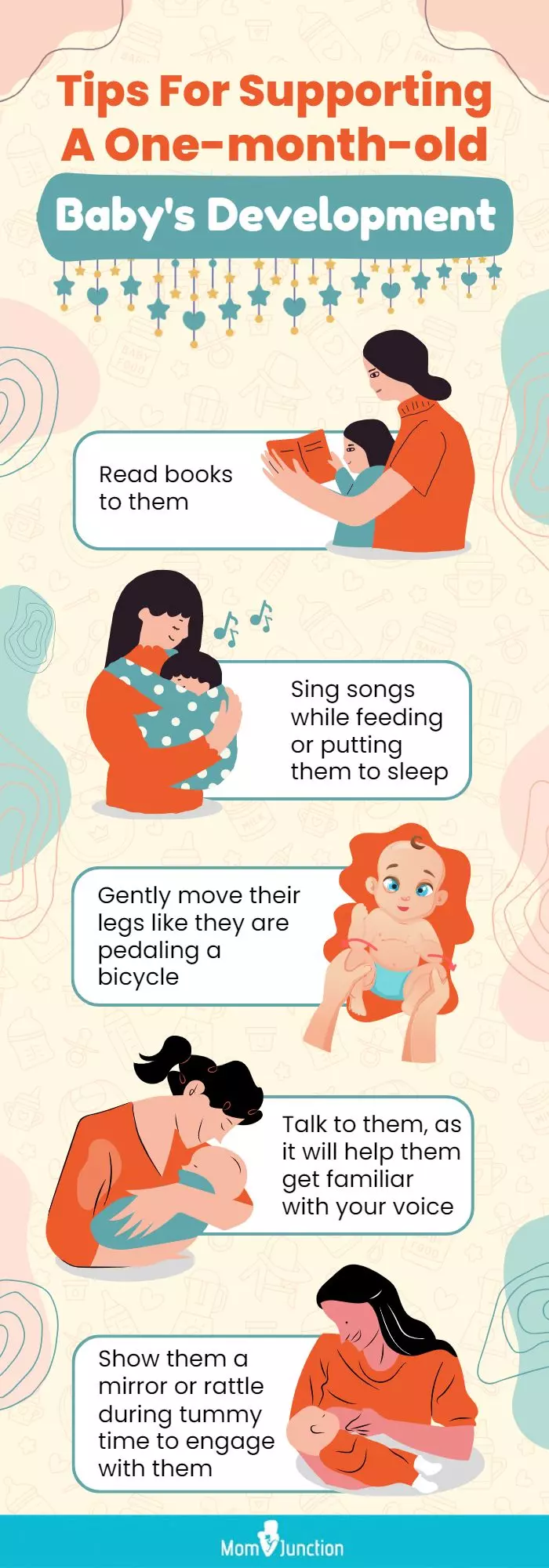
Illustration: Learning Activities For 1 Month Old Baby

Image: Dall·E/MomJunction Design Team
Welcome to our video on five essential newborn activities for the first month! We’ll show you how to bond with your baby and help them develop. Let’s get started!
Personal Experience: Source
MomJunction articles include first-hand experiences to provide you with better insights through real-life narratives. Here are the sources of personal accounts referenced in this article.
i. One Month Baby Development Milestones | What A 1 Month Old Can Do And How You Can Measure Growth!.https://www.youtube.com/watch?v=77DG8kHqWko
ii. Life With A One Month Old.
https://thepointsguy.com/news/life-with-a-one-month-old/
References
- Newborn development at 0-1 month: what’s happening.
https://raisingchildren.net.au/newborns/development/development-tracker/0-1-month - Ihianle E. Osagie and Donald N. Givler; Infant Head Lag.
https://www.ncbi.nlm.nih.gov/books/NBK567782/ - Newborn reflexes.
https://www.healthychildren.org/English/ages-stages/baby/Pages/Newborn-Reflexes.aspx - Cry In Infancy.
https://medlineplus.gov/ency/article/002397.htm - Corrected age: how old is your premature baby?
https://raisingchildren.net.au/newborns/premature-babies-sick-babies/development/corrected-age - Developmental Milestones: 1 Month.
https://www.healthychildren.org/English/ages-stages/baby/Pages/Developmental-Milestones-1-Month.aspx - Simple Ways to Entertain & Boost Your Baby’s Development at Home.
https://www.healthychildren.org/English/family-life/power-of-play/Pages/simple-ways-to-entertain-and-boost-your-babys-development-at-home.aspx - How music affects your baby’s brain: Mini Parenting Master Class
https://www.unicef.org/parenting/child-development/how-music-affects-your-babys-brain-class - Thinking and play: babies
https://raisingchildren.net.au/babies/play-learning/play-baby-development/thinking-play-babies - Tummy Time
https://kidshealth.org/en/parents/tummy-time.html - Tips to Make Tummy Time Easier
https://pathways.org/watch/tips-to-make-tummy-time-easier/ - What to Do When Babies Cry
https://kidshealth.org/en/parents/babies-cry.html
Community Experiences
Join the conversation and become a part of our nurturing community! Share your stories, experiences, and insights to connect with fellow parents.
Read full bio of Dr. Neha Bhave Salankar
Read full bio of Jessica Albert
Read full bio of Rohit Garoo
Read full bio of Vibha Navarathna





